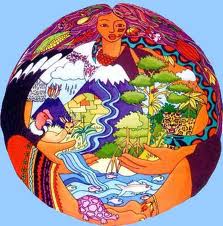I have the feeling that a lot is going on behind the scenes. Day three featured a mix of panels with expert testimony and reports by Working Groups. I’ll talk first about the latter. I attended presentations for the working groups on a global referendum on the rights of Mother Earth, and on technology transfer. After the latter, I spoke to a guy from Global Exchange, a San Francisco-based non-governmental organization, who had been made the chair. He explained to me that the working groups had been convened four months or so ago to pull together statements in each of their areas of interest. People could sign up on the website and participate in a discussion that led to the final working document. Then, at the conference, the four or five members of the working group synthesized all of these discussions to create the final document. Apparently there have been major interventions from organizations based in the global North to undermine these draft documents and to give them a neo-liberal spin.Today, a group of dissident groups calling themselves “Mesa 18” or “Working Group 18” (because their petition to be included among the other 17 working groups was denied) held a meeting in which they attacked the forms of fossil-fuel based development taking place in Bolivia today. Democracy Now! has an interview with Moira Millán, one of these Mesa 18 activists; check it out here.
In contrast with this back-door negotiating process, the expert panels were pretty uplifting. The one I attended (and documented earlier on the blog) focused on the rights of Mother Earth. I attended partially to see what was going on with Liberation theology today — I had understood that the Vatican had pretty much stamped it out over the last two decades. But I was also interested in the role of the legal experts who made appearances. The panel turned out to be quite powerful. Okay, there are clearly problems with the concept of pache mama or Mother Earth that has made such a strong appearance in the conference so far. This equation of the Earth with femininity and women potentially plays into some pretty regressive patriarchal representations of gender relations. But, as the Brazilian theologian Leonardo Boff explained, the point of this representation was to challenge hegemonic forms of commodification of the planet. The philosophical points advanced by Boff were then given far more tangible form by Cormac Cullinan and Mari Margil, two environmental activist lawyers. Their points about the objectification of nature in juridical discourse were powerful, and gave insight into an unfolding insurgent legal movement.
The rest of my day was spent attending a panel on labor unions and green jobs, which recycled many points I’d heard before while also giving some insight into unfolding campaigns. I then attended a caucus meeting of the North American delegation. There was some conflict about how this caucus should be organized, but we managed in the end to put together a working group and to advance some (but not nearly enough) action points. Among these was a suggestion that I made that we denounce the US’s recent policy of denying mitigation funds to Bolivia and Ecuador because of their refusal to sign on to the meaningless Copenhagen Accord. Plans were made by caucus participants to meet at the US Social Forum in June in Detroit to push organizing plans forward.


